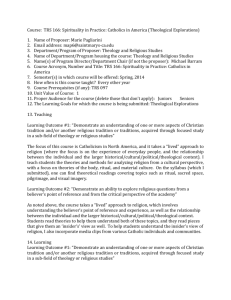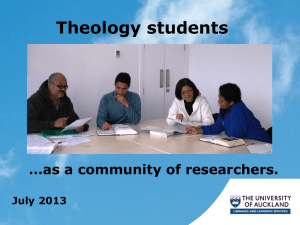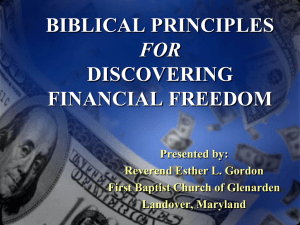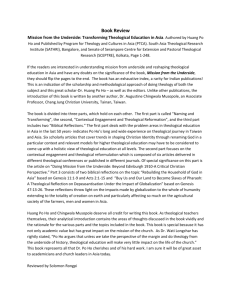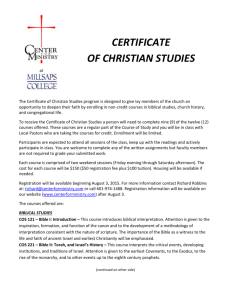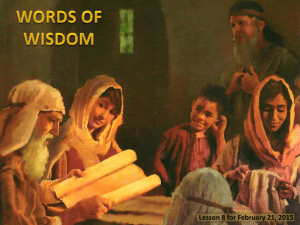ntro to Theological Research and Writing
advertisement
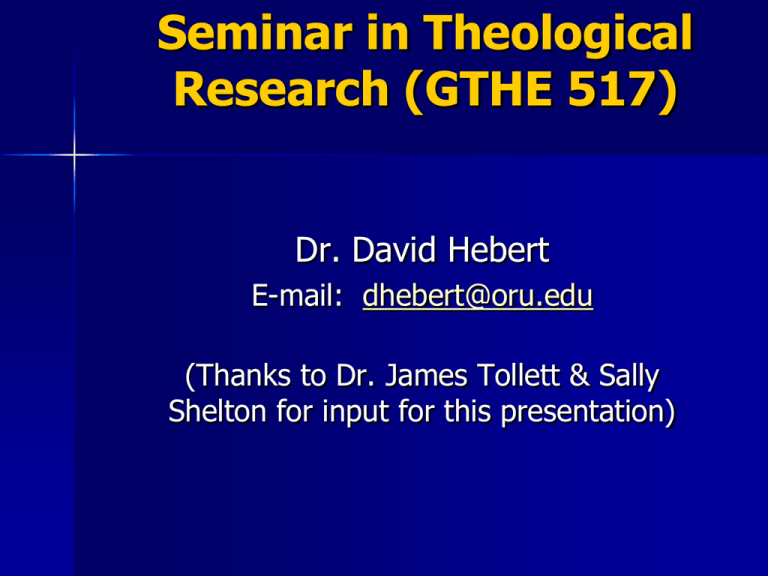
Seminar in Theological Research (GTHE 517) Dr. David Hebert E-mail: dhebert@oru.edu (Thanks to Dr. James Tollett & Sally Shelton for input for this presentation) Genesis (Beginnings) Introduce each other (name, where from?, & perceived giftedness to the Body of Christ) Introduce Course Material Tour of ORU Library with Prof. Jane Malcolm Continue with Course Material Consider These Statistics! (According to The Barna Research Group) Only 19% of “born-again” adults in America have a biblical worldview (6 March 2009) Of 601 Senior Pastors (random cross-section of Protestant churches), only 51% have a biblical worldview (12 January 2004) Only 15% of those who regularly attend Christian churches rate God as the highest priority in their life—compared to 70% of pastors who think their congregants rate God as the highest priority (10 January 2006), and Among “born-again” American Christians: 10% believe that people are reincarnated after death (21 OCT 2003) 29% believe it is possible to communicate w/the dead (21 OCT 2003) 53% believe a person can “earn” salvation based on good works (6 MAR 2009) Foundational Devotion 2 Tim 3:16/Prov 6:23 – Scripture is “God-breathed” & profitable for: Teaching, Reproof, Correction, Training/Instruction in Righteousness (Scripture is foundational and applies to all areas of our Christian lives to help keep us on the “right way/path”) What is each of our own unique “member/part” or purpose in the Body of Christ? (Rom 12:3-8; 1 Cor 12:12-30; Eph 4:7-16; 1 Pet 4:10-11—So that each of us may know and function in it fully to become a built up, unified and mature—pure & spotless—Body of Christ for which He shall return at the Rapture of the Church) (Caution!!!) Proverbs 19:2 – Rushing ahead without knowledge is not good 2 Tim 2:15 – “Earnestly Study” to show yourself approved to God as a workman able to “rightly divide the Word of Truth” (especially in the times in which we live & in light of 1 Tim 4:1-2, 7 & 2 Tim 4:34, regarding “deceptive spirits, doctrines of demons, myths, & old wives’ tales;” which amounts to false doctrine/heresy & the statistics above) Foundational Devotion (cont.) Therefore; Proverbs 1:7 – The “fear of the Lord” is the beginning of knowledge (The reverent, awestruck, holy respect for The Triune God of the Universe should be our attitude) Proverbs 1:23; 23:12 – “Turn back at my warning; behold, I will pour out my Spirit to you; I will make my words known to you” and “Apply your heart to instruction and your ears to words of knowledge” (Maintain a tender heart and a teachable soul) Proverbs 20:27 – The “human spirit” is the “lamp of the Lord” (Illuminated by the power of the Parakletos—the Comforter, One called alongside to help, the Holy Spirit—In our spirit, listen to the Holy Spirit and pray in the Holy Spirit) If we fulfill our part of this Conditional Promise; then the result will be: Proverbs 2:6 – For the Lord will then give: wisdom, knowledge, understanding, & protection to those who fear Him The Purpose resides in the Title of the Course Seminar – A small group of students in Graduate School engaged in original research or intensive study (Webster) Theological – from “Theos,” meaning God in Greek and “ology,” from lego or logos in Greek, meaning to relate in words or something said (including the thought and idea); by impl., a topic, subject or discourse (Strong’s)—a course of study about God (specifically, from a Christian & biblical view—the Triune God of the Bible) Research – scholarly or scientific investigation or inquiry requiring close, careful study (Webster) Seminars = Group discussion/work/collaboration+ Provide a safe environment for learning Provide illumination and insight Provide enhancement: value added = “something . . . that has been added to a product . . . to warrant a markup in the retail price” (Random House Unabridged Dictionary) Provide opportunities to think together, to share the fruit of our theological research & reflection Edward O. de Bary, Theological Reflection: The Creation of Spiritual Power in the Information Age (Collegeville, MN: Liturgical Press, 2003), p. 84. Rationale for Writing Assignments Writing contributes to intelligence by requiring analysis and synthesis of information. Writing develops initiative by requiring writers to develop a thesis statement, find research materials, and reflect upon/communicate findings independently Writing develops courage by requiring writers to give up anonymity. Writing increases the writers’ personal knowledge. Writing contributes significantly to improvement in reading skills. Donald H. Graves’ "Balance the Basics: Let Them Write," a 1980 Report to the Ford Foundation. Purpose Statement A Small Group of Graduate Students, that sets out together on the journey of conducting scholarly, original, and targeted investigation leading to a wellconstructed and written Theological Research Paper that measures up to the standard/canon Standard/Canon/Measuring Stick— Official School of Theology and Missions Style Manuals Research and Writing Manual. Latest Edition. Tulsa: Oral Roberts University School of Theology and Missions, 2005. Vyhmeister, Nancy Jean. Quality Research Papers: For Students of Religion and Theology. 2nd ed. Grand Rapids: Zondervan, 2008. Additional Textbooks Turabian, Kate L. A Manual for Writers of Research Papers, Theses, and Dissertations. 7th ed. Chicago: The University of Chicago Press, 2007. Fee, Gordon D., and Douglas Stuart. How to Read the Bible for All Its Worth. 3rd ed. Grand Rapids: Zondervan, 2003. Content Eight Steps to Producing a Research Strategy Elements of Writing That Produce Great Research Papers Eight Steps to Producing a Research Paper 1. 2. 3. 4. 5. 6. 7. 8. Select the Topic Research in Authoritative Summaries Narrow the Topic Build the Working Bibliography Take Notes Construct the Rough Draft Rewrite and Polish the Rough Draft Prepare the Final Copy Elements of Writing that Produce Great Research Papers Content Clarity Cohesion Order/ Organization Creativity/ Originality Word Choice – Precision – Succinctness Grammar Spelling Capitalization Flow/ Transitions Formatting References – Choice – Citation formatting
